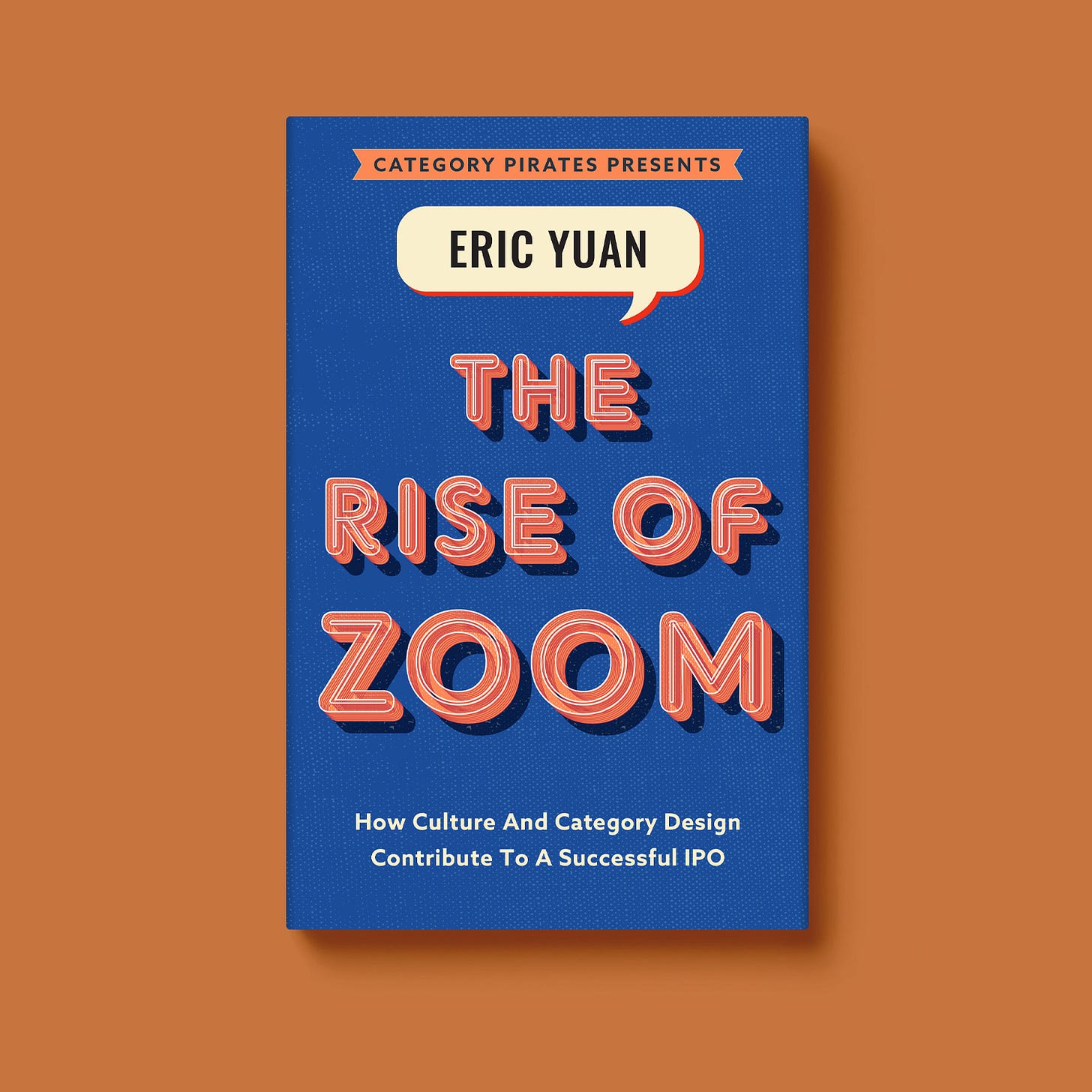Eric Yuan: The Rise Of Zoom
How Culture And Category Design Contribute To A Successful IPO
Arrrrr! 🏴☠️ Welcome to a 🔒 subscriber-only edition 🔒 of Category Pirates. Each week, we share radically different ideas to help you design new and different categories. For more: Dive into an audiobook | Listen to a category design jam session | Enroll in the free Strategy Sprint email course
This Pirate Profile is inspired by Eric Yuan on Christopher Lochhead's Follow Your Different podcast.
Pirate Profiles is a series by Category Pirates spotlighting legendary Category Designers across a wide range of industries and disciplines.
In these Pirate Profiles, you will discover:
Untold stories of Category Designers who shaped the world we live in today (that you probably have never heard of before—but whose products, services, and platforms you have used thousands of times!).
The radically different POVs these Category Designers evangelized in the world—and the obstacles they had to overcome to move people’s thinking FROM where it was TO somewhere new.
Their strategies, frameworks, and mental models for successfully designing & dominating new categories of consequence.
Every legendary entrepreneur, executive, investor, and creator of any kind is a Category Designer.
We want to tell their stories—because the best way to become a Pirate is to study other Pirates.
ARRRRRRRRR!!!!!!!
Dear Friend, Subscriber, and Category Pirate,
When the COVID lockdowns started in March 2020, the demand for the videoconferencing platform Zoom exploded.
By April, 300 million people attended Zoom meetings every day. (That was a 30x increase in the number of users from the beginning of the year.) And just like FedEx or Google, Zoom became a verb.
People would “Zoom” for online work meetings, school classes, and a host of other life events:
Birthday parties
Court proceedings
Weddings and funerals
Workout classes
Therapy sessions
Doctor appointments
And so much more
As a result, most people connected to the internet know about (or have used) Zoom.
But even before the pandemic, this Silicon Valley startup had begun to shake up the video conferencing market category with its easy-to-use interface and high-quality video and audio. It had a super successful IPO in 2019, raising nearly $357 million. All thanks to the vision and culture instilled by its founder and CEO, Eric Yuan.
Yuan was a guest on Pirate Christopher’s Follow Your Different podcast in the Fall of 2019. In the interview, they discussed the rise of Zoom, its culture of happiness, and the path to innovation.
Let’s dive in and explore how Yuan turned Zoom into a Category King.
Yuan Is An Engineer, Business Leader, And Visionary
“Imagine a world where no matter what you say, the other side can understand you without learning a new language, and they also can shake hands [over Zoom]. In the future, if we can leverage technology to connect people seamlessly, we are going to make the world a much better place.” – Eric Yuan
Yuan was born and raised in China, and he moved to Silicon Valley in 1997 to be part of the tech boom. But it wasn’t easy—the US government denied his visa application eight times.
"I never wanted to give up on anything I tried to pursue," says Yuan about that time. "I told myself, 'Hey, as long as you allow me to try, I will try forever until I get it.'"
Before moving to the United States, Yuan used that tenacity to earn his bachelor's degree in applied mathematics from the Shandong University of Science and Technology and a master's degree in geology engineering from China University of Mining and Technology.
Here are some highlights of Yuan’s career:
1997: Yuan joined Webex as the VP of Engineering, becoming one of its first 20 employees.
2006: Yuan graduated from the Executive Program at Stanford University Graduate School of Business.
2007: Cisco acquired Webex, and Yuan continued on as the VP of Engineering.
2011: Yuan pitched a new smartphone-friendly video conferencing system to Cisco, but the company rejected his idea. So, he left Cisco with a team of engineers to found Zoom Video Communications.
2019: Zoom became a public company, and Yuan became a billionaire.
Yuan is not only a mission-driven entrepreneur and thinker—he's also a legendary category designer. In 2022, Zoom dominated over 55% of the videoconferencing software market share. Its closest competitor was Microsoft Teams, which held just 20% of the total market share.
Yuan's vision for Zoom is to connect a billion knowledge workers worldwide.
So let's see how he's using category design to make it happen.
Yuan’s Category Design Philosophy: Start From The End-User’s Perspective
“If the customer doesn’t like your product, nothing will matter. You have to take a step back, assess what you can do differently, and build something better than your competitors. The number one priority when building a business is making sure customers truly love your product.” – Eric Yuan
Yuan always begins by asking, “What would make the user happy?”
“The reason why I left Cisco Webex was that I did not see a single happy customer,” says Yuan. Not wanting to make the same mistake at Zoom, he prioritized monitoring the company's NPS score and keeping customers satisfied. Eventually, he realized that many Webex customers switched to Zoom because they enjoyed the ease of use and improved experience.
And he used several category design principles to make that happen.




